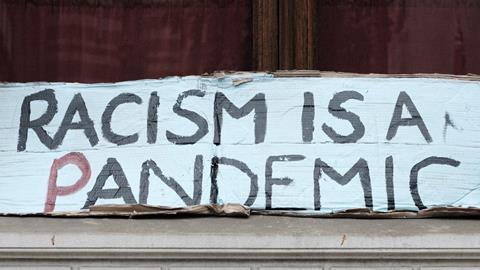11th February marks Racial Justice Sunday in the UK. Clare Williams, founder of Real Questions, looks at why we must challenge both external injustices and the flaws within our own hearts, and how the cross of Jesus brings us hope
The theme of this year’s Racial Justice Sunday is ‘Exodus! Justice for God’s people on the move’. Find out more and download free resources here.
We do not have to look far to see injustices of every kind in our world. A quick scroll through social media, tuning in to the radio and watching the news are reminders of the pain that exists in our global community. Wars, conflicts and climate change displace families, unravel governments and traumatise children. All of this brings sorrow. And yet, these wounds are exacerbated when individuals face discrimination in these circumstances because of their race or ethnic background.
I remember watching the tragic scenes of Ukrainian towns smoking in the wake of attack from Russian forces. This was truly heart breaking. Scenes we never expected to witness in our modern age of progress. I also remember the stories of Africans who were studying in the Ukraine, but faced the added barrier of racism when trying to flee. I didn’t want to believe it. But sadly, it was true. At times of crisis when we should love each other more deeply, people of colour can often experience further prejudice.
Flawed hearts
Racial Justice Sunday is a time for us to pause and lament unfair systems that affect our neighbour. But the Christian faith goes further, challenging us to consider injustices out there and the flaws within our own hearts.
Disparities in health care, education or policing, which affect people of colour disproportionately in the UK, do not simply exist as brute facts in society. Unjust structures emanate from somewhere; the bible points to the machinations of our flawed hearts (Matthew 15:19, Romans 3:23). For good or for ill, the decisions we make in our collective history and present can have generational, ripple effects (Psalm 145:4, 2Kings 24:8-9).
In the Old Testament, we see a God who takes this kind of injustice very seriously. The law and prophetic books offer sharp rebukes against corrupt leadership, which often forgets the most vulnerable and the other, or the stranger (Leviticus 19:33-34). In Micah 7:3, the prophet laments: “Both hands are skilled in doing evil; the ruler demands gifts, the judge accepts bribes, the powerful dictate what they desire – they all conspire together.”
Conversations like this can be difficult. We may feel upset or despair. Will things ever be made right?
Read more:
How should we respond to racial injustice?
Why racial justice matters
Racial justice: Why and how should we fight for it?
Bishop Arun Arora: Advent, the incarnation and racial justice
The immigrant Jesus
Fulfilling God’s righteous judgement in the prophetic books, the New Testament reveals how God, in the person of Jesus, knows what it feels like to suffer injustice. Jesus’ family was poor. When they brought an offering to the synagogue, it was pigeons or turtledoves rather than a bull or ram, likely because this is what their family could afford (Leviticus 1:14, Luke 2:24).
Jesus’ parents were immigrants. Seeking refuge from an infanticidal decree, they fled to Egypt where they were given sanctuary (Matthew 2:13-23). Jesus lived under the occupation of the Roman Empire and in his trial, he was sent back and forth between state officials who were deciding his fate (Luke 23:1-25).
Jesus was executed in a most shameful way (Galatians 3:13). Crucifixion was harrowing enough but it also carried with it a certain prejudice. It was a form of punishment largely meted out upon non-Roman citizens. In the words of Roman statesman, Cicero: “It is a crime to bind a Roman citizen; to scourge him is a wickedness; to put him to death is almost parricide. What shall I say of crucifying him? So guilty an action cannot by any possibility be adequately expressed by any name bad enough for it.”
Get access to exclusive bonus content & updates: register & sign up to the Premier Unbelievable? newsletter!
Hope
The cross is a picture of both pain and triumph; through the resurrection, injustice does not have the final say. The cross gives us hope. Hope in a saviour who was mistreated, yet defeated the powers of sin and injustice. A hope to repent and seek restoration.
Clare Williams is the founder of Real Questions, a platform which explores the intersection of race and faith within the Black British context. She completed her undergraduate degree in English Language and Literature at The University of Oxford, and then worked as an English teacher and senior leader in various South East London schools for 10 years. Whilst teaching, Clare achieved an MA in Leadership, and in the summer of 2018 she completed further study in Theology at Wycliffe Hall and apologetics at OCCA, The Oxford Centre for Christian Apologetics. Clare also has an MA in Culture, Diaspora & Ethnicity from Birkbeck, University of London. She is now a doctoral student conducting research in Sociology at The University of Westminster.























